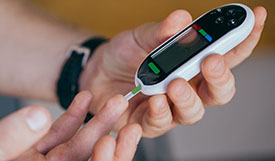Office of Research & Development |
 |
January 14, 2022

Photo: ©Getty Images/Natalia Shabasheva
In January 2009, VA researchers published a study in the New England Journal of Medicine titled “Glucose Control and Vascular Complications in Veterans with Type 2 Diabetes.” In that large randomized clinical trial, funded by the VA Cooperative Studies Program (CSP #465) and known as the VA Diabetes Trial (VADT), investigators showed that intensive glucose control in patients whose type 2 diabetes had previously been poorly controlled had no significant effect on the rates of major cardiovascular events such as coronary artery disease and stroke, compared to those who were using standard glucose control measures.
The research team also found that the two groups of patients had similar death rates, and that both groups had similar levels of complications from diabetes such as diabetic neuropathy and retinopathy, except that patients using standard glucose control measures had higher levels of albumin in their urine. (Albumin in the urine is a possible indicator of kidney disease.)
The trial, and two follow-up studies, provided needed information that is now used to allow care providers to make appropriate decisions on how to institute intensive glycemic control, how long such control is necessary, who may benefit from it, and who should be treated more conservatively, with the knowledge that not all patients will benefit from intensive glycemic control. For example, VADT’s results played an important role in the development of current VA and Department of Defense clinical practice guidelines for the management of type 2 diabetes mellitus in primary care.
Study included nearly 1,800 Veterans
For over seven years, the study’s researchers tracked nearly 1,800 patients with diabetes. In particular, they examined cardiovascular disease (CVD), the cause of death in nearly two-thirds of patients with diabetes. Their goal was to determine whether intensive levels of glucose control (using medication and other methods to reduce the level of sugar in the blood in diabetic patients to levels that would be normal in patients without diabetes) were beneficial to patients.
The researchers concluded that both very high and very low blood sugar levels can be dangerous, and that big swings between high and low levels are also potentially harmful.
Patients who intensively manage their glucose levels monitor those blood levels frequently and adjust oral medications and the amount of insulin they take accordingly. Their goal is to achieve glucose levels about the same as those for people who do not have diabetes. At least three injections of insulin a day are common in patients who are trying to intensively control their glucose levels.
The initial study helped confirm that tight glucose control can be achieved safely in most patients; however, patients with long-standing diabetes and at high risk for CVD who tightly controlled glucose levels received only a modest benefit in reducing their CVD over a five- to six-year period. This supported the idea that glucose control needs to be personalized. Clinicians, the researchers concluded, need to better identify those who are likely to benefit from intensive control of their glucose levels. They also should be more judicious in recommending intensive control to those who are older, sicker, at risk for hypoglycemia, and already have CVD.
Findings published from longer-term follow-up
As a follow-up to VADT, VA researchers looked at whether the improvements in glucose control made by one of the groups in the trial led to better long-term outcomes. They collected information on the VADT cohort for more than nine years of additional study, using VA's electronic records system. The team reported in 2015 that patients who had been in the intensive-control group had a lower incidence of cardiovascular events after the trial was over, but their survival rates were no better than those of the other group.
Most recently, in a 15-year follow up study published in 2018, the team concluded that the years of aggressive lowering of blood sugar levels resulted in no evidence of a legacy effect or mortality benefit after the 15-year interval. The cohorts also showed no differences in death from all causes, and a long-term trend of reduced kidney events was insignificant, suggesting that there was no carryover benefit from the earlier period. However, glucose-lowering reduced the consequences of diabetes on average, in terms of long-term protection against cardiovascular disease, for those who continued to lower their blood sugar levels. The investigators referred to these benefits as “modest” however, and stated that these modest benefits must be weighed against adverse effects of aggressive glucose level lowering such as hypoglycemia (a condition in which blood sugar levels are lower than normal) and weight gain.
Selected publications:
Intensive glucose control in patients with Type 2 Diabetes – 15 year follow-up. Reaven PD, Emanuele NV, Wiitala WL, Bahn GD, Reda DJ, McCarren M, Duckworth WC, Hayward RA, VADT investigators. N Engl J Med. 2019 Jun 6:380(23):2215-2224.
Follow-up of glycemic control and cardiovascular outcomes in type 2 diabetes. Hayward RA, Reaven PD, Wiitala WL, Bahn GD, Reda DG, Ge L, McCarren M, Duckworth WC, Emanuele NV, VADT investigators. N Engl J Med. 2015 Jun 4;372(23):2197-206.
Glucose control and vascular complications in veterans with type 2 diabetes. Duckworth W, Abraira C, Moritz T, Reda D, Emanuele N, Reaven PD, Zieve FJ, Marks J, Davis SN, Hayward R, Warren SR, Goldman S, McCarren M, Vitek ME, Henderson WG, Huang GD, VADT investigators. N Engl J Med. 2009 Jan 8;360(2):129-39.
VA/DoD clinical practice guidelines for the management of type 2 diabetes mellitus in primary care. Version 5.0 2017
The legacy and lessons of the VA Diabetes Trial, VA Research Quarterly Update, Spring 2015.